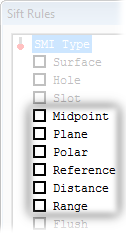
Topic Contents: Hide
Constructed Features are features that are fabricated by CM4D using existing Features as Reference Features. These constructed features can be created either manually in CM4D or with a DataSmith translator.
The Constructed Feature types are available in the Sift Rules dialog.

To change the markers on the View, go to the View Properties. On the View tab, click Feature Marker in the bottom right portion of the dialog.
All changes made in the Feature Marker Properties dialog will apply to all of the feature markers for that type throughout the View, and will be saved at the document level.
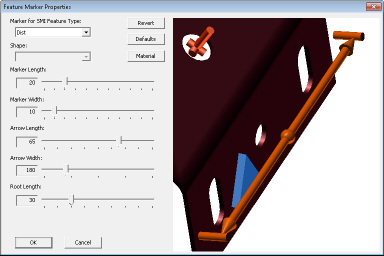
To change the marker for an individual Feature, find the Feature in the Data Tree. Right click the Feature label and select Properties. An alternative method is to change this value manually using DataUtility, but you must know the specific values needed as there is no visual interface for the marker properties there.
All changes made in the Feature Properties dialog will apply to the feature marker for the selected feature ONLY, and will be saved to the Database as a property of the selected feature.
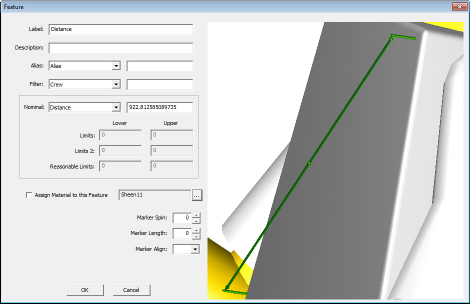
Using Feature Level Properties can help to differentiate features from one another within the same View.
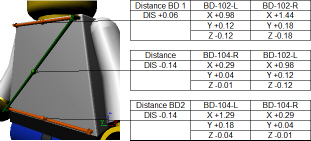
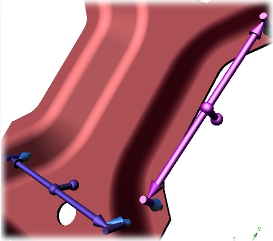
A Midpoint feature is a feature that is designated as a Constructed Midpoint and fits the criteria specified in the table in the topic Feature. The Midpoint type is a Constructed feature created by CM4D that is the calculated midpoint between two Reference features.
A Midpoint feature is represented in a view by a fuchsia marker that consists of extension lines and a dimension line with arrowheads.
|
Default Midpoint Feature Marker without Augment Reference Features |
Default Midpoint Feature Marker with Augment Reference Features |
|
|
|
The Midpoint feature marker Material (color/texture), extension length, and thickness (Marker Width) may be modified either per View (vie the View Annot Properties) or per Feature (via the Feature Properties dialog).
A Plane feature is a feature that is designated as a Constructed Plane and fits the criteria specified in the table in the topic Feature. The Plane type is a Constructed feature created by CM4D that is a calculated plane through three Reference features.
A Plane feature may be used as a Reference feature for other Constructed Feature types, such as Distance.
A Plane feature is represented in a view by a blue triangular feature marker. The three Reference Features which create the Plane make up the vertices of the feature marker.
|
Without Augment Reference Features |
With Augment Reference Features |
|
|
|
The Plane feature marker Material (color/texture) and thickness (Marker Width) may be modified either per View (via the View Annot Properties) or per Feature (via the Feature Properties dialog).
A Distance feature is a feature that is designated as a Constructed Distance and fits the criteria specified in the table in the topic Feature. The Distance type is a Constructed feature created by CM4D that is the calculated distance between two Reference features.
A Distance feature is represented by an orange marker that consists of extension lines and a dimension line with arrowheads.
|
Without Augment Reference Features |
With Augment Reference Features |
|
|
|
The Distance feature marker Material (color/texture), extension length, and thickness (Marker Width) may be modified either per View (via the View Annot Properties) or per Feature (via the Feature Properties dialog).
When a Distance feature uses a Plane feature as one of the two required Reference features, the distance feature marker will be adjusted so that the extension lines point to the center of the plane.
Feature marker behavior when a Distance feature references a Plane feature.
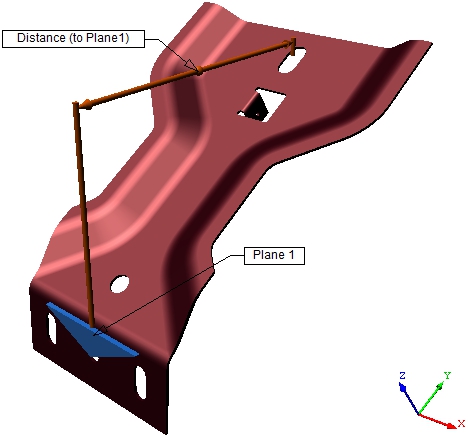
A Range feature is a feature that is designated as a Constructed Range and fits the criteria specified in the table in the topic Feature. The Range type is a Constructed feature created by CM4D that is the calculated range of values for the assigned Constructed Reference features. The Range feature will be given the same Characteristics as each of its Reference Features.
The Range feature marker is an orange line with tapered ends. The Range marker color and thickness (Marker Width) may be modified either per View (via the View Annot Properties) or per Feature (via the Feature Properties dialog).
|
Without Augment Reference Features |
With Augment Reference Features |
|
|
|
The following variables are available for calculating statistics on Range features:
|
Variable |
Returns: |
|
~rstat,count~ |
The number of Range features that are in the DataSet. |
|
~rstat,mean~ |
The mean value of the range of deviations. |
|
~rstat,hi~ |
The highest value in the range of deviations. |
|
~rstat,lo~ |
The lowest value in the range of deviations. |
|
~rstat,stddev~ |
The standard deviation within the range of deviations. |
|
~rstat,ppk~ |
The Ppk value of the range of deviations. |
A Polar Feature is a feature that is designated as a Constructed Polar and fits the criteria specified in the table in the topic Feature. The Polar type is a Constructed feature created by CM4D that has a Polar characteristic and represents the Miniball radius of the selected Reference features.
See the topic Polar Charts for more information on Polar features and Miniball.
A Reference Feature is a feature that is designated as a Reference and fits the criteria specified in the table in the topic Feature. The Reference type is a non-inspected feature point whose measurement values always have a deviation of zero.
A Reference feature marker color and other properties may be customized either per View (vie the View Annot Properties) or per Feature (via the Feature Properties dialog). By default, the Reference feature marker is a green cube.